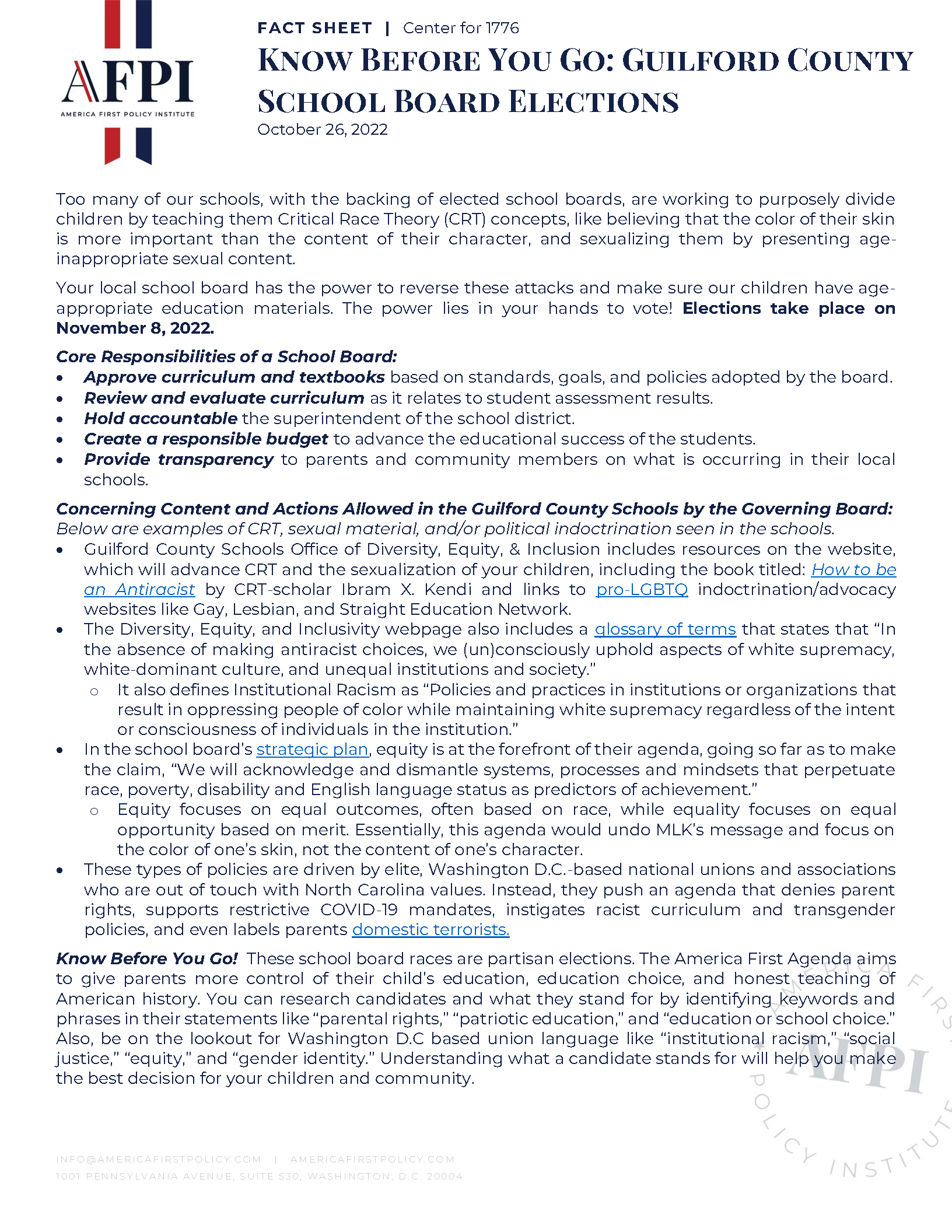Know Before You Go: Guilford County School Board Elections
Key Takeaways
Core Responsibilities of a School Board: Approve curriculum and textbooks based on standards, goals, and policies adopted by the board.
Core Responsibilities of a School Board: Review and evaluate curriculum as it relates to student assessment results.
Core Responsibilities of a School Board: Hold accountable the superintendent of the school district.
Too many of our schools, with the backing of elected school boards, are working to purposely divide children by teaching them Critical Race Theory (CRT) concepts, like believing that the color of their skin is more important than the content of their character, and sexualizing them by presenting age-inappropriate sexual content.
Your local school board has the power to reverse these attacks and make sure our children have age-appropriate education materials. The power lies in your hands to vote! Elections take place on November 8, 2022.
Core Responsibilities of a School Board:
- Approve curriculum and textbooks based on standards, goals, and policies adopted by the board.
- Review and evaluate curriculum as it relates to student assessment results.
- Hold accountable the superintendent of the school district.
- Create a responsible budget to advance the educational success of the students.
- Provide transparency to parents and community members on what is occurring in their local schools.
Concerning Content and Actions Allowed in the Guilford County Schools by the Governing Board:
Below are examples of CRT, sexual material, and/or political indoctrination seen in the schools.
- Guilford County Schools Office of Diversity, Equity, & Inclusion includes resources on the website, which will advance CRT and the sexualization of your children, including the book titled: How to be an Antiracist by CRT-scholar Ibram X. Kendi and links to pro-LGBTQ indoctrination/advocacy websites like Gay, Lesbian, and Straight Education Network.
- The Diversity, Equity, and Inclusivity webpage also includes a glossary of terms that states that “In the absence of making antiracist choices, we (un)consciously uphold aspects of white supremacy, white-dominant culture, and unequal institutions and society.”
- It also defines Institutional Racism as “Policies and practices in institutions or organizations that result in oppressing people of color while maintaining white supremacy regardless of the intent or consciousness of individuals in the institution.”
- In the school board’s strategic plan, equity is at the forefront of their agenda, going so far as to make the claim, “We will acknowledge and dismantle systems, processes and mindsets that perpetuate race, poverty, disability and English language status as predictors of achievement.”
- Equity focuses on equal outcomes, often based on race, while equality focuses on equal opportunity based on merit. Essentially, this agenda would undo MLK’s message and focus on the color of one’s skin, not the content of one’s character.
- These types of policies are driven by elite, Washington D.C.-based national unions and associations who are out of touch with North Carolina values. Instead, they push an agenda that denies parent rights, supports restrictive COVID-19 mandates, instigates racist curriculum and transgender policies, and even labels parents domestic terrorists.
Know Before You Go! These school board races are partisan elections. The America First Agenda aims to give parents more control of their child’s education, education choice, and honest teaching of American history. You can research candidates and what they stand for by identifying keywords and phrases in their statements like “parental rights,” “patriotic education,” and “education or school choice.” Also, be on the lookout for Washington D.C based union language like “institutional racism,” “social justice,” “equity,” and “gender identity.” Understanding what a candidate stands for will help you make the best decision for your children and community.
